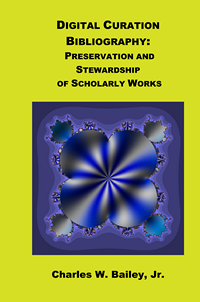Jeanine Marie Scaramozzino, Marisa L. Ramírez, and Karen J. McGaughey have published "A Study of Faculty Data Curation Behaviors and Attitudes at a Teaching-Centered University" in the latest issue of College & Research Libraries.
Here's an excerpt:
This paper describes information gathered from a survey distributed to the College of Science and Mathematics faculty at California Polytechnic State University, San Luis Obispo (Cal Poly), a master's-granting, teaching-centered institution. There was a more than 60 percent response rate to the survey. The survey results provided insight into the science researchers' data curation awareness, behaviors, and attitudes, as well as what needs they exhibited for services and education regarding maintenance and management of data. It is important that professional librarians understand what researchers both inside and outside their own institutions know so that they can collaborate with their university colleagues to examine data curation needs.
| Digital Curation Bibliography: Preservation and Stewardship of Scholarly Works | Digital Scholarship |

